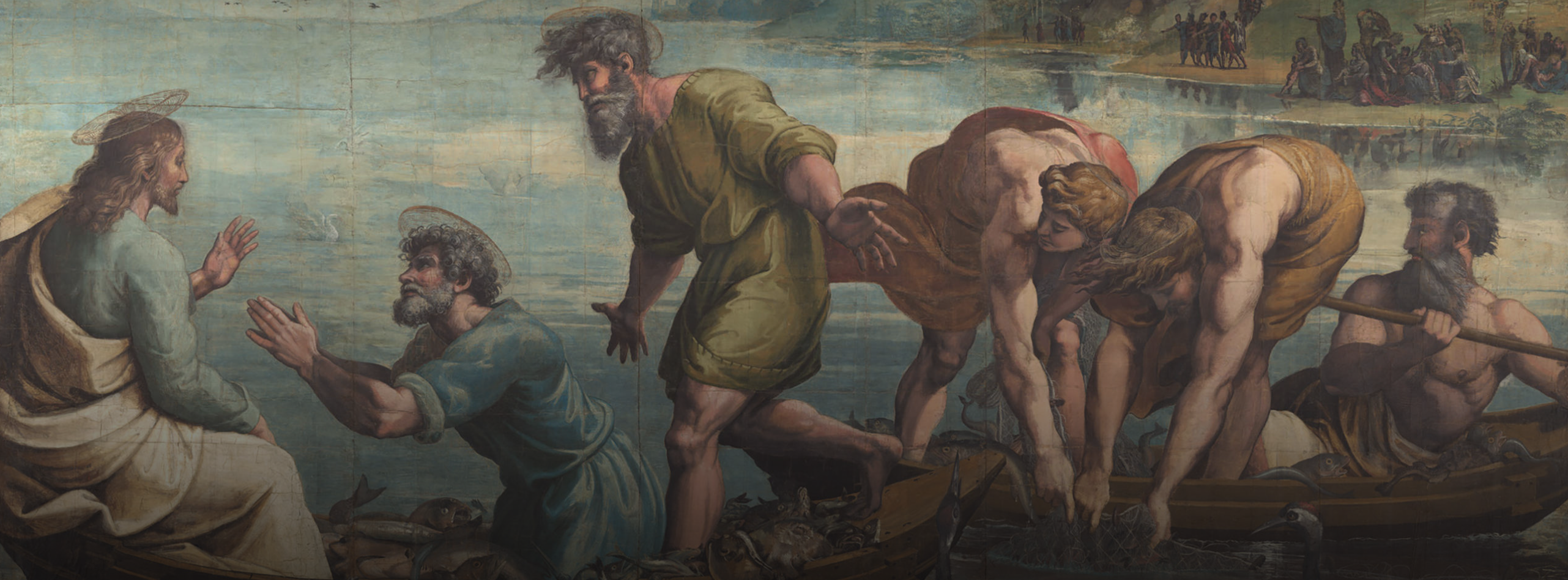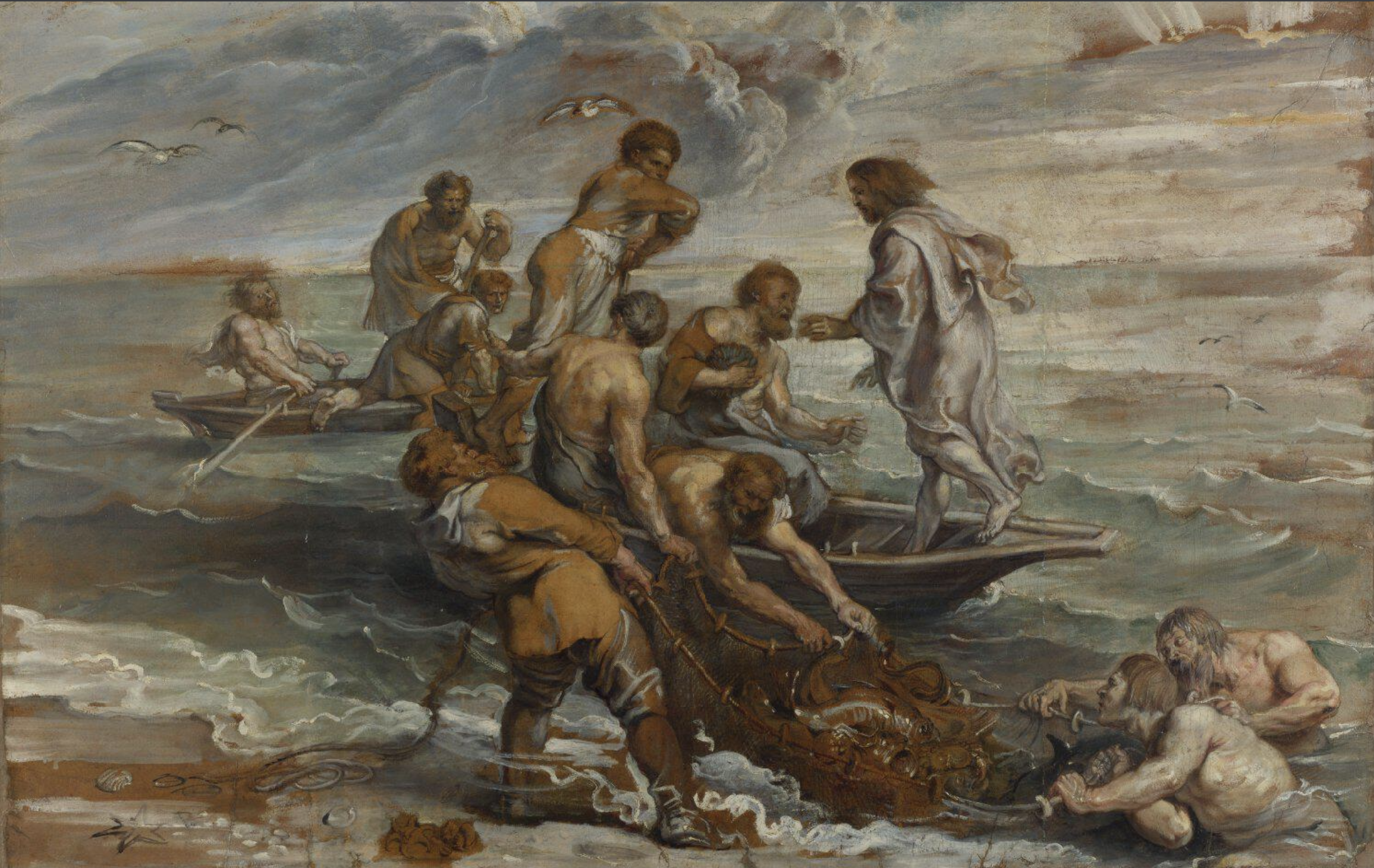
John 20:1-10 (Matins)
2 Corinthians 9:6:11
Luke 5:1-11
"At Thy Word"
And Simon answering said unto him, Master, we have toiled all the night,
and have taken nothing: nevertheless at thy word I will let down the net.
In the Name of the Father and of the Son and of the Holy Ghost.
Our Gospel lesson this morning
has been known as the Miraculous Draft of Fishes at least since the late Middle Ages.
It symbolizes, among other things, the abundance of Christian life.
We mean that specifically:
a life that is truly Christian.
This proceeds only from holy vocation,
not necessarily formal religious vocation.
The Konrad Witz painting of the scene is considered a breakthrough event
in Northern Renaissance art
incorporating both distant landscapes joined to minute detail.
Raphael's rendering of this scene is considered one of the greatest
masterpiece of the Italian High Renaissance.

Peter Paul Rubens, in his masterpiece,
combines elements of Jesus' display of power
in commanding the winds and waves
with
this present show of mastery over even the creatures of the sea.
Certainly,
the scene shines in the Gospels as a transformative moment
as the Apostles are suddenly enveloped in the power and glory of God.
After all,
this is St. Luke's stated theme.
Directly after returning from the wilderness where He has been tempted by Satan,
|
Jesus returned in the power of the Spirit to Galilee, and news of Him went out through
all the surrounding region. And He taught in their synagogues, being glorified by all.
(Lu 4:14-15)
|
We know the scene well:
Jesus is backed up to the shore of Lake Gennesaret as a multitude
"pressed about Him to hear the word of God."
He steps into the boat owned by Simon bar Jonah
asking him to put out from land a little,
so He could preach to the enormous crowd.
Meantime, four, yet-to-be-called, Disciples have been out all night fishing
but have caught nothing.
Some are washing their nets in disgust.
When Jesus had finished speaking, He turned
to Simon and implored,
|
"Launch out into the deep and let down your nets for a catch."
(Lu 5:4)
|
The weary fisherman replied to the Stranger,
|
"Master, we have toiled all night and caught nothing;
nevertheless at Thy Word I will let down the net."
(Lu 5:5)
|
Let us pause here to understand what is happening.
St. Luke has taken pains to demonstrate that these waters are vacant.
Four skilled fishermen have plied their trade all night
confirming this fact.
Simon's word "toiled"
kopiásantes
signifies that they are exhausted.
Yet,
while the others are cleaning up after a long night of thankless work,
Simon has been listening to the elevating words of Jesus preaching the Kingdom of God.
So he consents to let down his net, calling Jesus "Master"
—
Epistátes meaning
"overseer," "superintendent," or "a man having certain authority" ..... though He is a Stranger.
And when he does,
great shoals of fishes, coming out of nowhere, flood into his nets
until they are near bursting.
So many are caught that two boats
(for Simon has summoned his partners)
are close to sinking.
We picture the water just below the gunwhales getting ready to flood into the boat!
Knowing that he has been surrounded by Divine power,
Simon instinctively kneels:
When Simon Peter saw it, he fell down at Jesus' knees, saying,
"Depart from me, for I am a sinful man, O Lord!"
(Lu 5:8)
|
Now, here Epistátes (overseer) has been elevated to Kúrie (Lord or King,
the Greek noun used for "YHWH" in the LXX).
Like Isaiah similarly surrounded by the Divine
(you recall, Isaiah finds himself in the courts of God),
Simon Peter declares, in effect,
"I am a man of unclean lips!" (Isa 6:5).
Notice that suddenly,
Simon's name has shifted to Simon Peter.
His conversion has begun.
His old life now begins to slip away,
never again to be retrieved.
What did we hear at the conclusion of our Gospel lesson?
They walked away from everything and followed Him.
Surely,
Rubens is right to have combined Jesus' command over the winds and the waves
with His miraculous mastery over even the creatures of the sea.
The overall effect
is a signature moment of God in the wilderness
(from which Jesus has lately appeared)
feeding His people with manna:
the multitude on the shore
and
the multiplication of fishes from not one to perhaps thousands.
Now remember,
St. Luke, too, is a painter,
the first icon painter.
And like all painters,
he brings together many, seemingly disparate,
details to convey powerful, even holy, meaning.
He is the first of many masters to render this scene of power and grace,
albeit with words.
The meanings seen upon his canvas
include
God as Providence (He supplies all our needs)
and
God as Pantocrator (He is Sovereign Ruler over all).
Standing near to this power,
we realize that we are nothing:
powerless and humbled.
You see, we depend upon Him entirely.
The image of Simon letting down his net into what he knows to be vacant waters
reveals the ordinary world with the Divine present just below the surface.
It were as if Jesus said, "Not that side of the boat; this side of the boat."
In this,
the Master (as Simon calls Him)
is not simply Provider,
but also Spiritual Director.
He directs Simon to put out a little.
He teaches Him Divine things (that is, in His preaching).
And He directs Simon to venture "out into the deep."
Is this not a picture of our own world in which
dimensions of Divinity are barely hidden in our quotidian lives.
And the way to find these dimensions is two-fold:
we must discern the guiding hand of God,
and
we must do.
Generally
speaking,
an
angel will not appear to us as one did before the Holy Mother of God.
We must venture.
We must toil.
We must do.
In this,
let us consider that our Gospel lesson is about vocation,
which, of course, is what St. Luke intends,
for this is his version of the Calling of the Disciples,
God's vocare ("to call"):
For he and all who were with him were astonished at the catch of fish which they had taken;
and so also were James and John, the sons of Zebedee, who were partners with Simon.
And Jesus said to Simon, "Do not be afraid. From now on you will catch men."
So when they had brought their boats to land, they forsook all and followed Him.
(Lu 5:9-11)
|
A very important principle has been articulated.
Without God we toil mindlessly always coming to nothing.
What did we hear in our Epistle lesson this morning?
|
Remember this: Whoever sows sparingly will also reap sparingly, ....
(2 Cor 6:6)
|
Abundance lies alone with God.
Yet no matter how vacant and barren our world made seem,
there is always more in the Creation God has fashioned.
Do we not
see the pattern all around us?
What could be more common:
people laboring all their lives
only to learn that it has led nowhere
and
valued at nothing.
Pardon me,
but I saw a meme recently while posting a reflection.
One or two people sat in the pews of a large church
for a man's memorial service.
His wife leaned over to the women next to her and whispered,
"I don't understand it.
He had so many thousands of friends on Facebook."
Even the secular world learns this deflating truth.
What does the pop music song say?
He's tradin' in his Chevy for a Cadillac
And if he can't drive
With a broken back
At least he can polish the fenders ....
(Billy Joel, "Movin' Out")
|
When you are parted from Divine guidance
(or never sought it in the first place),
everything will be senseless toil.
And
all things that you will do will come to nothing.
For a job, any job, is not your vocation.
In our scene this morning,
Simon (and, we imagine, his brother Andrew),
James and John
are working at empty jobs.
Their labors have resulted in empty nets,
symbolizing empty lives.
Theirs is the life of futility.
And this will always be the way.
But when you arrive to vocation,
you stand on the spot on this earth where power flows through you,
where gifts come rapidly into bloom,
where things comes easily into your hand.
You are filled with unmistakable grace.
Our culture may term this place the "sweet spot"
likening it to "zen."
But this is nothing other than the power of God
awaiting each of us upon the square of our vocation.
A little to the left won't do.
A little to the right won't do.
Not that side of the boat,
but this side.
In St. John's telling of the scene,
the Risen Christ (who again appears as a stranger) tells them,
|
"Cast the net on the right side of the boat, and you will find some."
(Jn 21:6)
|
Only one place is your vocation.
It is narrowly defined.
You might say, it is subtle and hidden,
yet when you find it, nothing could be more powerful
sweeping aside all that had been your life.
The overwhelming,
prepared for you,
waiting for you.
And why this place of ease and grace?
Because our God has so much to do
and so few with whom to do it.
Jesus will say four chapters hence in Luke,
"Truly, the harvest is great but the laborers are few!" (Lu 9:37-38).
When finally willing instruments come into His hands .... ardently, eagerly,
prepared to serve,
He puts them to use,
and
He assists them.
Blessings fall heavily wherever the Kingdom of God is concerned.
For here is the blessed circle of light on earth
which is the refuge from the world,
built from living stones like you and me unto a spiritual house (1 Peter 2:5),
one life at a time
—
sincere, obedient, and with hearts filled with love.
I read an Orthodox elder who wrote
that people spend their time praying that God will send them
the perfect spouse or lead them to the perfect life.
But, says the Elder, He already has:
to love God with all your heart and with all your soul and with your mind,
this is the perfect life.
This is the perfect spot on which you must stand.
This is the greatest adventure upon which these four Disciples have been called.
They will learn the love of God.
And in this, they will be called into a kind of doing that will open to them
and
to many others,
the Kingdom of Heaven.
Truly, our lesson is about vocation.
Here is the place
where emptiness is transformed into abundance.
But we must stand upon the spot which God has ordained for us.
He instructs Simon to launch out into the deep,
and
Simon launches out into the deep.
He instructs Simon to let down his net,
and
Simon lets down his net.
So
we must venture "out into the deep"
perhaps to the place where we do not want to go.
You see, we are doing something else just now (we say).
There are other important things in the offing.
Nonetheless, we must go;
we must do,
as Jesus advises Simon.
Otherwise, the Divine power God has waiting for us
will never be seen and never be felt.
And our lives will have been for nothing.
Let us then not tarry!
Let us not dither or become distracted!
Let us launch our little boats out into the deep.
And we pray, this will mark a beginning,
for Divine appointments indisputably await us all.
And the adventure of our lives lies always just ahead,
where the Lord is waiting and beckoning to us.
In the Name of the Father and of the Son and of the Holy Ghost. Amen.

